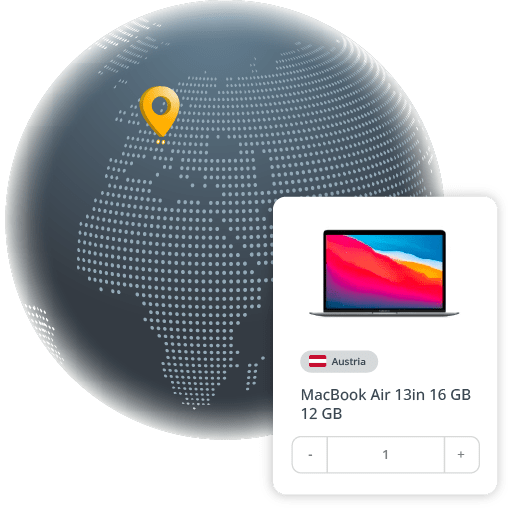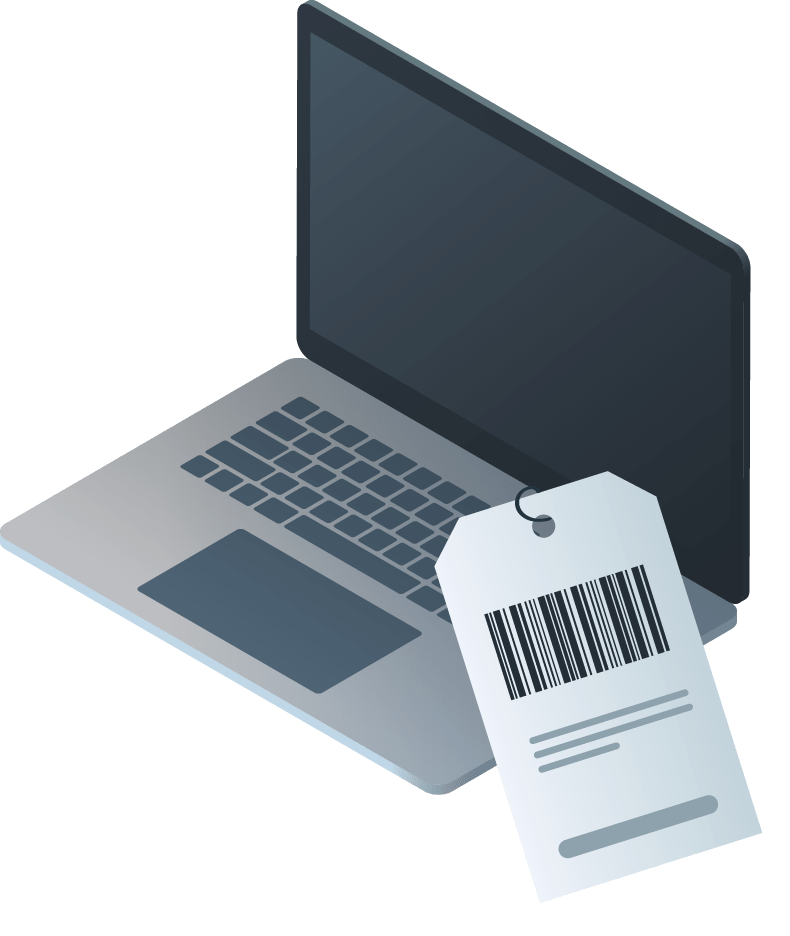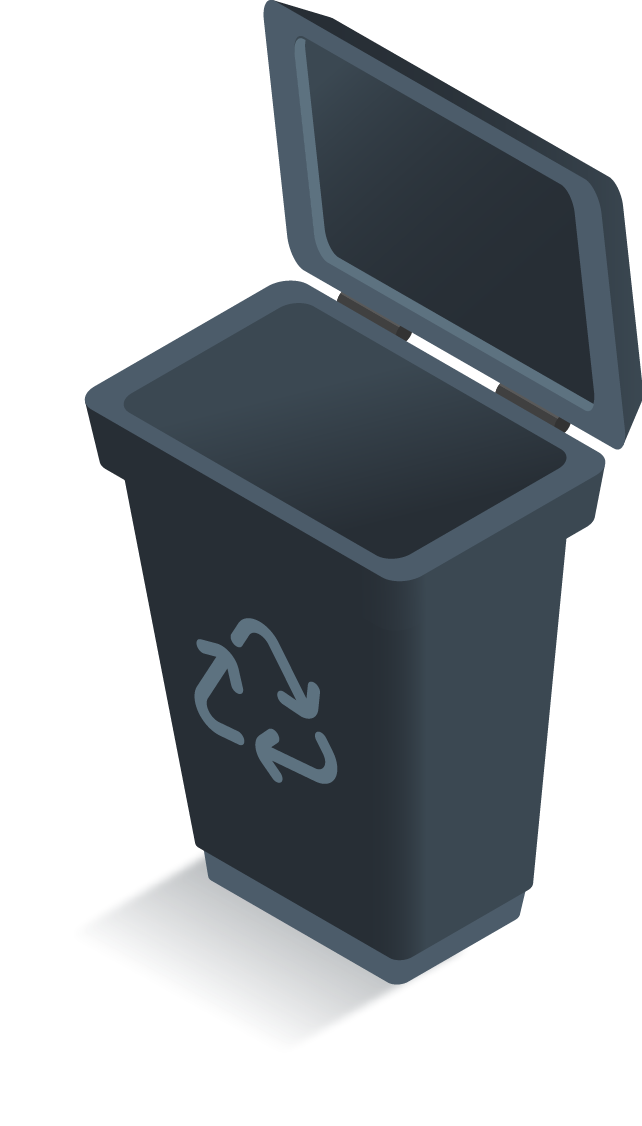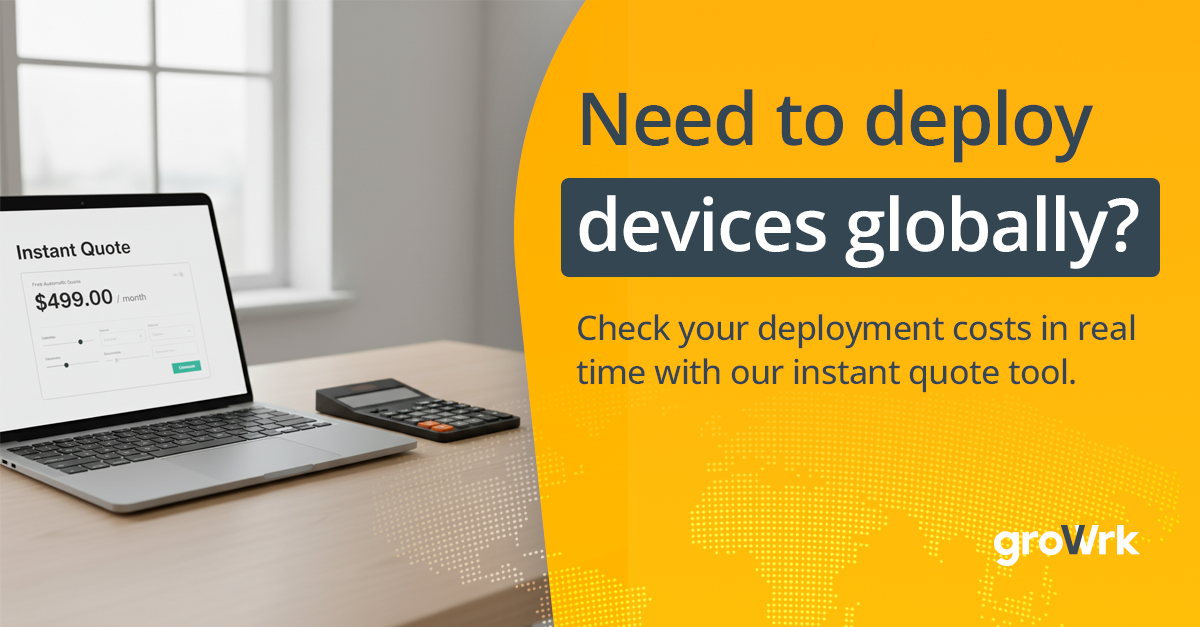How to send IT equipment to Austria
Looking to ship IT equipment to your team in Austria? GroWrk makes it hassle-free! We streamline the entire process, ensuring everything runs smoothly from start to finish. Whether you're sending laptops, servers, or other tech, we take care of all the logistics, including managing customs, coordinating deliveries, and making sure everything complies with local Austrian regulations.

At a glance
Austria's fast-growing digital economy has positioned it as a central hub in Europe for businesses seeking to expand their IT operations. From cutting-edge tech startups to global enterprises, Austria offers a favorable environment for IT professionals and companies alike.
|
CURRENCY Euro (EUR) |
OFFICIAL LANGUAGE German |
TIME ZONE Central European Time (CET) GMT+01:00 Central European Summer Time (CEST) GMT+02:00 during daylight saving time |
|
CUSTOMS DUTY ON ELECTRONICS 0-5% + 20% VAT Generally 0-5% customs duties and 20% VAT, with potential reductions or exemptions for specific types of goods |
SHIPPING LEAD TIME 3-7 days (depending on location and shipping method) |
IT OUTSOURCING MARKET €6.2 billion Valued at €5.5 billion in 2024, with significant growth expected, reaching €6.2 billion by 2025 |
Overview of IT operations in Austria

Digital innovation and adoption: Austria is known for its commitment to digital transformation, with widespread use of online services across both the public and private sectors. With initiatives in areas like e-commerce, fintech, and digital government services, Austria continues to drive forward its digital agenda, supported by a robust network of tech innovators and startups. The country is also deeply invested in research and development, positioning itself as a leader in the European digital economy.
Advanced IT infrastructure: The country's well-developed IT infrastructure includes high-speed internet, extensive fiber-optic networks, and state-of-the-art data centers. These factors create an ideal environment for cloud computing, hosting services, and digital business expansion, making Austria a top choice for IT operations in Europe.
Commitment to sustainability: Austria stands out for its green technology initiatives. The country is a forerunner in adopting energy-efficient technologies and green IT practices. Many Austrian companies, including data centers, rely on renewable energy sources, helping reduce the environmental footprint of digital operations. This focus on sustainability is aligned with Austria’s broader environmental goals, which include reducing carbon emissions and promoting energy efficiency.
Skilled workforce: Austria’s education system places a strong emphasis on technology and digital skills, which results in a highly skilled workforce. With a high number of IT graduates, the country has a deep talent pool in fields like software development, cybersecurity, data science, and IT infrastructure management. This makes it easier for businesses to find qualified professionals who can drive their IT initiatives forward.
Business-friendly environment: Austria offers a stable, transparent regulatory environment with favorable tax policies and strong data protection laws. The country's strategic location in Central Europe makes it an attractive destination for international companies, offering access to both the EU market and the wider region. In addition, Austria provides various incentives for businesses to grow, including financial support for innovation and R&D projects.
Robust cybersecurity measures: Austria has a solid cybersecurity strategy in place, prioritizing the protection of critical infrastructure, sensitive data, and digital systems. The government continuously works to enhance cybersecurity through proactive regulations and initiatives, ensuring a safe and secure digital environment for both businesses and consumers.
Growing tech ecosystem and startups: The Austrian tech ecosystem is thriving, with cities like Vienna emerging as hotbeds for innovation. The startup scene is vibrant, supported by a variety of funding opportunities, incubators, and accelerators. The government actively promotes entrepreneurship, providing financial support and incentives to foster the growth of new tech companies.
Shipping IT equipment to Austria: What you need to know
| Customs regulations |
|
| Duties and taxes |
|
| Required documentation |
|
| Import restrictions |
|
| New vs. Used equipment |
|
| Customs clearance process |
|
| Penalties or fines for non-compliance |
|
Checklist for sending laptops to Austria
When shipping laptops to Austria, it’s important to follow a few best practices to ensure the process goes smoothly, and your equipment arrives safely and on time. Here are some helpful shipping tips:

Select trusted couriers: Choose reliable couriers such as GroWrk, DHL, UPS, FedEx, or Österreichische Post for international shipping. These carriers offer tracking services and have experience handling Austrian customs procedures.
Check service levels: Select the appropriate shipping option based on urgency. Express shipping (2-5 days) for high-priority deliveries. Standard shipping (5-10 days) for cost-effective options.
Use high-quality packaging: Secure laptops with sturdy, padded boxes and protective materials like bubble wrap, foam inserts, or air cushions to prevent damage during transit.
Disassemble where possible: If shipping accessories like chargers, docking stations, or monitors, package them separately to prevent damage. Remove detachable components if applicable.
Label clearly: Ensure the recipient’s name, address, and contact details are correctly labeled. Mark the package as "fragile" to encourage careful handling.
Accurate product descriptions: On the commercial invoice, provide a detailed and accurate description of the laptop, including its brand, model, and serial number. Inaccurate descriptions may cause customs delays.
Value declaration: Declare the correct value of the laptop to avoid under- or over-declaring, which could lead to customs inspections or fines. The declared value determines any applicable duties and taxes.
Customs declarations: Since Austria is in the EU, shipments from within the EU do not require customs clearance. However, for shipments from outside the EU, include: EU Single Administrative Document (SAD), commercial invoice, and packing list
Proof of origin: If applicable, include a certificate of origin to determine eligibility for preferential trade agreements, which may reduce duties.
Understand import duties & taxes: Laptops are duty-free under the EU tariff classification but are subject to 20% VAT on the declared value, including shipping costs.
Pre-pay duties and taxes: Some couriers allow for pre-paid duties and taxes to simplify customs clearance and prevent the recipient from facing unexpected charges upon arrival.
Protect against loss or damage: Consider purchasing shipping insurance for high-value laptops to protect against loss, theft, or damage during transit.
Compliance with Austrian regulations: Ensure compliance with EU electronic safety standards, including CE marking, WEEE (Waste Electrical and Electronic Equipment), and RoHS (Restriction of Hazardous Substances) regulations before shipping.
Use tracking tools: Major couriers provide real-time tracking—monitor shipments closely to anticipate customs clearance updates and delivery progress.
Stay in touch with the recipient: Notify the recipient about the expected delivery timeline, tracking updates, and any customs-related requirements to avoid delays.
Expect weather and seasonal delays: Winter weather and peak shipping periods (e.g., Christmas, Black Friday, Austrian public holidays) may cause delivery delays. Plan shipments accordingly.
Austrian domestic delivery options: For final delivery, consider working with Österreichische Post, DPD Austria, GLS Austria, or Hermes Austria for efficient last-mile distribution.

Average cost of IT Equipment in Austria
Laptops (Business Grade):
- Mid-range: €370 - €740
- High-end: €740 - €1,480
High-end models such as Apple MacBook Pro, Dell XPS, and Lenovo ThinkPad are priced on the higher end.
Monitors (Business Grade):
- Standard: €80 - €160
- Ultrawide/4K: €220 - €380
Monitors from trusted brands like Dell, Samsung, and LG typically range within these prices, with 4K or ultrawide models costing more.
Desktops (Business Grade):
- Standard Desktop PC: €200 - €740
- Workstation Desktop (for high-performance tasks): €740 - €2,000+
Prices depend on the brand and specifications, with options from HP, Lenovo, and Apple among the most common.
Printers (Laser):
- Standard Office Printers: €60 - €160
- High-Volume Printers: €300 - €1,000
Leading brands such as HP, Canon, and Brother offer a wide range of models for office environments.
Public holidays & IT work hours to plan your shipment
-
Key public holidays in Austria:
- New Year’s Day – January 1
- Epiphany – January 6
- Easter Sunday – Date varies
- Easter Monday – Monday after Easter Sunday (date varies)
- Labour Day – May 1
- Ascension Day – 40 days after Easter (date varies)
- Whit Monday – 50 days after Easter (date varies)
- National Day – October 26
- All Saints' Day – November 1
- Immaculate Conception – December 8
- Christmas Day – December 25
- Boxing Day – December 26
Typical work hours for IT professionals
- Standard Workweek
- The legal workweek in Austria is typically 40 hours, with employees usually working from 9:00 AM to 6:00 PM, Monday to Friday, with a one-hour lunch break.
- Many companies, especially in the IT and tech sectors, offer flexible working hours, allowing employees to adjust their start and end times to fit personal schedules while still adhering to the 40-hour workweek.
- Overtime
- Overtime in Austria is generally regulated, and if employees are required to work beyond their standard hours, they must be compensated accordingly. Employees are entitled to either additional pay or time off, depending on their contract and company policy.
- Overtime pay is typically higher than the regular hourly rate, often at a rate of 1.5 times the regular pay. In some industries, overtime worked on weekends or public holidays may be compensated at an even higher rate, reflecting the extra demands of those hours.
- Public Holiday Work
- Public holidays like Christmas and Labour Day often lead to office closures or shorter work hours for IT professionals, depending on the company’s policies. If you’re in Austria and happen to work on a public holiday, you might receive holiday pay.
- Many companies offer extra compensation, typically at a higher rate, or give employees additional time off as a way to make up for working on those days. It’s always good to check with your employer to understand the specific benefits and policies around public holiday work.
What to consider when retrieving IT equipment from employees in Austria
| Local delivery and logistics services |
|
| Inventory management |
|
| Logistics challenges for remote locations |
|
| Equipment agreement with employees |
|
How to dispose of IT equipment in Austria
Data wiping
- Data wiping: Use certified software to thoroughly erase all data from hard drives, SSDs, or any other storage devices before disposal. This ensures that sensitive information is securely wiped and cannot be recovered.
- Shredding and destruction: For enhanced security, physical destruction of storage devices, such as shredding or crushing, guarantees that no data can be retrieved from the equipment.
WEEE compliance (Waste Electrical and Electronic Equipment Directive)
- Certified e-waste disposal: To meet Austria's environmental standards, companies must use certified e-waste disposal services that comply with the European Union's WEEE Directive. These services ensure the safe dismantling of equipment, with hazardous materials like batteries or mercury being responsibly disposed of.
- Recycling centers: Small electronics can be taken to designated recycling centers, while larger IT assets like servers or office-wide equipment often require specialized disposal services.
Repurposing IT equipment
- Donation to charitable organizations: Many schools, non-profits, and community groups in Austria accept donations of functional IT equipment. Donating the devices to such institutions can be an excellent way to repurpose equipment if it is still in good condition.
- Internal repurposing: If your company frequently upgrades its IT assets, consider reusing older equipment for non-critical tasks within the organization or distributing it to different departments that may have lower technological needs.
Manufacturer take-back programs
Many IT equipment manufacturers in Austria provide take-back programs, allowing businesses to return old devices for recycling or repurposing. These programs ensure responsible disposal and help organizations comply with local environmental regulations.
Certified e-waste recycling providers
It is essential to choose third-party disposal services certified by the Chief Inspectorate of Environmental Protection or other relevant authorities. These providers will handle the recycling and necessary legal documentation, ensuring that the disposal process meets environmental standards and that your company can receive certificates of destruction or recycling as proof of proper disposal.

Local IT Outsourcing Solutions in Austria
You can streamline your IT logistics and asset management with GroWrk’s comprehensive global solution. Whether it’s shipping equipment or managing IT assets across multiple regions, GroWrk helps you stay compliant and efficient, every step of the way. Here’s why GroWrk is the ideal partner for managing your IT assets in Austria:

| 1. Wide global coverage |
GroWrk operates in over 150 countries, including Austria, making sure your IT equipment deployment is smooth, no matter where your teams are located. With our local expertise in Austria, you’ll get the support that’s tailored to Austrian regulations and business practices, ensuring your team is always taken care of. |
| 2. End-to-end asset management |
From procurement to deployment and beyond, GroWrk simplifies the entire IT asset lifecycle. Whether it’s managing day-to-day operations or handling end-of-life disposal, we handle the heavy lifting so you can focus on driving your business forward while keeping IT operations efficient and hassle-free. |
| 3. Intuitive platform for easy deployment |
Our easy-to-use platform gives you centralized control over device deployment, shipment tracking, and asset monitoring. By streamlining these processes, we reduce administrative work and logistical headaches, making IT management in Austria more efficient than ever. |
| 4. Smooth delivery and equipment retrieval |
GroWrk takes care of delivering laptops and other IT equipment directly to your teams in Austria. We also manage equipment retrieval from employees leaving the company, making the process quick, easy, and cost-effective, so you don’t have to worry about a thing. |
| 5. Compliance with Austrian import regulations |
We ensure that all shipments comply with Austria’s import and tax regulations, including customs procedures and product certifications. From import duties to VAT, GroWrk makes sure your IT operations are always in line with local standards, helping you avoid any unnecessary delays or compliance issues. |
| 6. Efficient repairs and maintenance |
GroWrk handles everything related to IT repairs and maintenance. Whether it’s routine checks or emergency repairs, we keep your devices in top shape, minimizing downtime and keeping your employees productive. |
| 7. 24/7 Support for peace of mind |
With our dedicated support team available around the clock, you can count on us whenever you need assistance. Whether it’s about IT asset management, logistics, or shipping, GroWrk is here to ensure you get the support you need whenever you need it. |
Procure, configure, and deploy your IT devices from one platform


